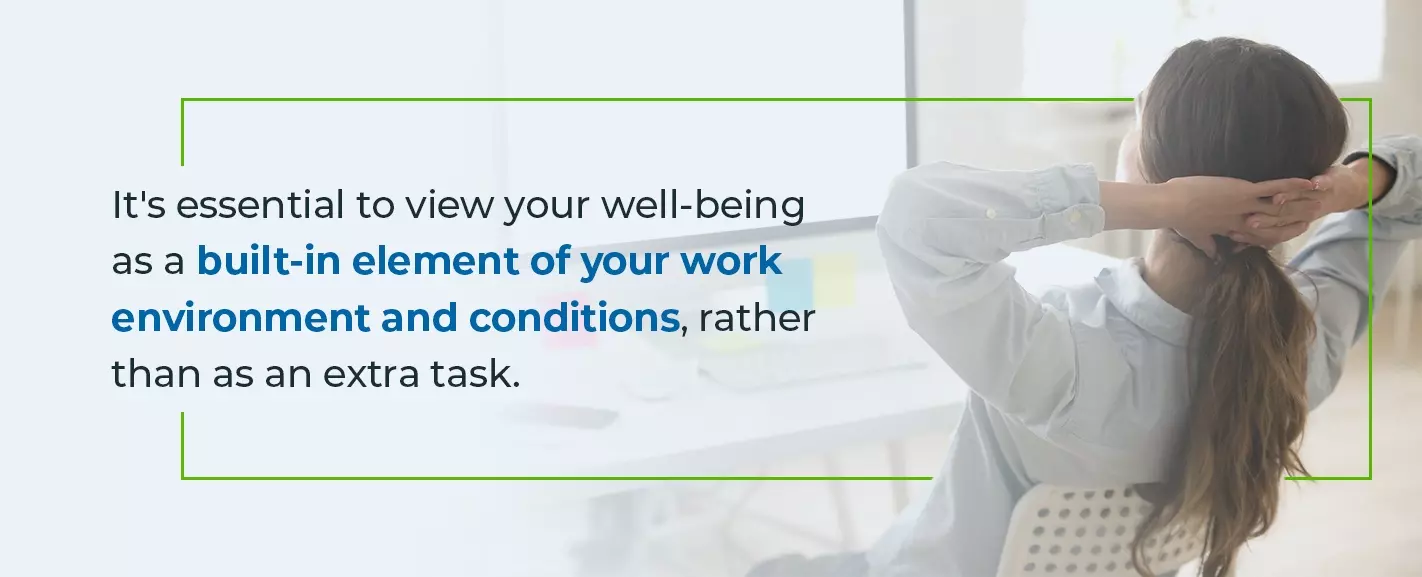Anxiety disorders, which include panic disorders, post-traumatic stress disorder (PTSD), obsessive-compulsive disorder (OCD) and generalized anxiety disorder (GAD), are the most common mental illnesses affecting Americans. About 40 million people in the U.S. live with anxiety, and it can have severe repercussions for your work performance. Symptoms of anxiety include:
- Excessive worry, which can be personal or work-related
- Intense bouts of fear and apprehension
- Inability to concentrate
- Forgetfulness
- Poor memory
- Irritability and emotional reactions
- Tension
- Depression
- Physical issues such as headaches, upset stomach and dizziness
8 Healthy Ways to Handle Anxiety at Work
Anxiety is uncontrollable and often debilitating — handling it on the job is not always easy, but getting it under control is necessary for career and personal progress. If you are having trouble dealing with anxiety and stress levels at work, here are some positive steps you can take:
1. Know Your Triggers
Coping with workplace anxiety means learning what sets off your anxiety symptoms. When you know what will lead to periods of acute anxiety, you can take appropriate steps to mitigate the stress or possibly avoid the trigger altogether. One technique for identifying anxiety triggers is to keep a journal and document when you start to feel anxious. Over time, you'll spot patterns and be able to figure out what triggers you.
2. Develop Go-To Grounding Tools
One key concern is how to work with anxiety, as you can't simply drop everything every time symptoms strike. Anxiety is a fight or flight response that produces physical symptoms that you can address by bringing yourself back into the present moment. Many people find that having a plan for what to do when they're anxious at work helps minimize symptoms. Things like short meditation sessions, a walk around the office or a quick call to a friend are all excellent techniques for learning how to overcome anxiety at work.
3. Create the Right Conditions
 It's essential to view your well-being as a built-in element of your work environment and conditions, rather than as an extra task. You may find that small changes, like moving to a desk with better natural light, working with noise-cancelling headphones and avoiding too much caffeine accumulate to create an environment where anxiety is less likely to arise.
It's essential to view your well-being as a built-in element of your work environment and conditions, rather than as an extra task. You may find that small changes, like moving to a desk with better natural light, working with noise-cancelling headphones and avoiding too much caffeine accumulate to create an environment where anxiety is less likely to arise.
4. Share Your Struggles in the Workplace
While you may feel uncomfortable doing so, sharing your anxiety struggles with your workplace can actually help. Because of the Americans with Disabilities Act (ADA), you won’t have to worry about being discriminated against or fired due to your struggles. Sharing about your anxiety with your boss can help you receive any necessary accommodations. You can also talk about your anxiety struggles with a trusted co-worker. They may be able to offer advice and support on how to handle anxiety at work.
5. Set Micro-Goals
Managing anxiety at work is significantly easier when you break your goals down into bite-sized pieces, so you don't overwhelm yourself. If you're trying to do more networking, for example, it's much more reasonable to commit to attending one industry event per month rather than trying to fit one in per week. Be realistic and honest with yourself about what you can achieve, and you'll find yourself gaining momentum without pushing yourself too hard.
6. Work Within Your Limits
When dealing with anxiety at work, it is crucial to work within your limits instead of against them. Don’t jump from one task to another — that will only add to the stress you are feeling. Instead, set small deadlines, create manageable steps and focus on one task at a time. It is also important to take breaks when needed. Trying to push through anxiety often makes the symptoms worse and may extend their duration unduly.
7. Practice Healthy Habits
Healthy habits can have a direct impact on your mood. When dealing with anxiety at work, practicing good health habits is essential. To help cope with anxiety at work and take better care of yourself, be sure to:
- Get seven or more hours of sleep each night.
- Stay hydrated.
- Eat fresh and healthy foods — avoid processed and packaged foods, sugar, alcohol and caffeine.
- Create a work/life balance.
8. Use Anxiety to Your Benefit
 When anxious thoughts begin to creep in, stop what you are doing, and follow these three simple steps:
When anxious thoughts begin to creep in, stop what you are doing, and follow these three simple steps:
- Acknowledge it
- Welcome it
- Use it
This process helps you validate what you are feeling and contributes to self-compassion and acceptance. Once you acknowledge and welcome these feelings, you can then use this new mindset and positive perspective to your benefit.
Causes of Workplace Stress and Anxiety
What causes work-related anxiety? In most cases, it arises from a combination of these issues:
- Low pay or lack of benefits
- Meeting deadlines
- Conflict with co-workers or management
- Managing others
- Long workdays
- Over-demanding managers or bosses
- Excessive workload
- Lack of direction in tasks
- A perceived lack of fair treatment
- Inability to control elements of the work environment
While even one of these is enough to trigger symptoms, most people dealing with workplace stress are handling more than one at a time. It's crucial to take stock of what you can control or address, and take steps to change that first.
How to Tell Your Employer About Anxiety
If you're frequently coping with anxiety at work, consider letting your employer know about the situation and requesting accommodations that will allow you to work more comfortably. Some accommodations commonly requested for anxiety include:
- A flexible schedule
- A schedule with modified breaks
- A private area to rest
When bringing up anxiety with your employer, be sure to be specific and focus on solutions. Rather than making a blanket statement like "my anxiety keeps me from working," let them know that an altered schedule or another accommodation could improve the quality and quantity of your work. Since the act of talking to your employer can in itself induce anxiety, it may help to formalize your request in writing.
Getting Professional Help for Coping With Anxiety at Work
While workplace anxiety can feel like it is overwhelming, there is a lot of hope. Anxiety is one of the most treatable mental illnesses. At Advanced Psychiatry Associates, we offer mental health services that include comprehensive testing and evaluations to figure out what is causing your anxiety. Treatment for managing anxiety often includes either medication such as antidepressants or anti-anxiety drugs or psychotherapy, such as counseling and cognitive behavior therapy. Sometimes a combination of both helps you find ways to manage anxiety at work or meets your specific needs. If you would like to discuss your anxiety and how you can effectively manage it, schedule an appointment with us today.






